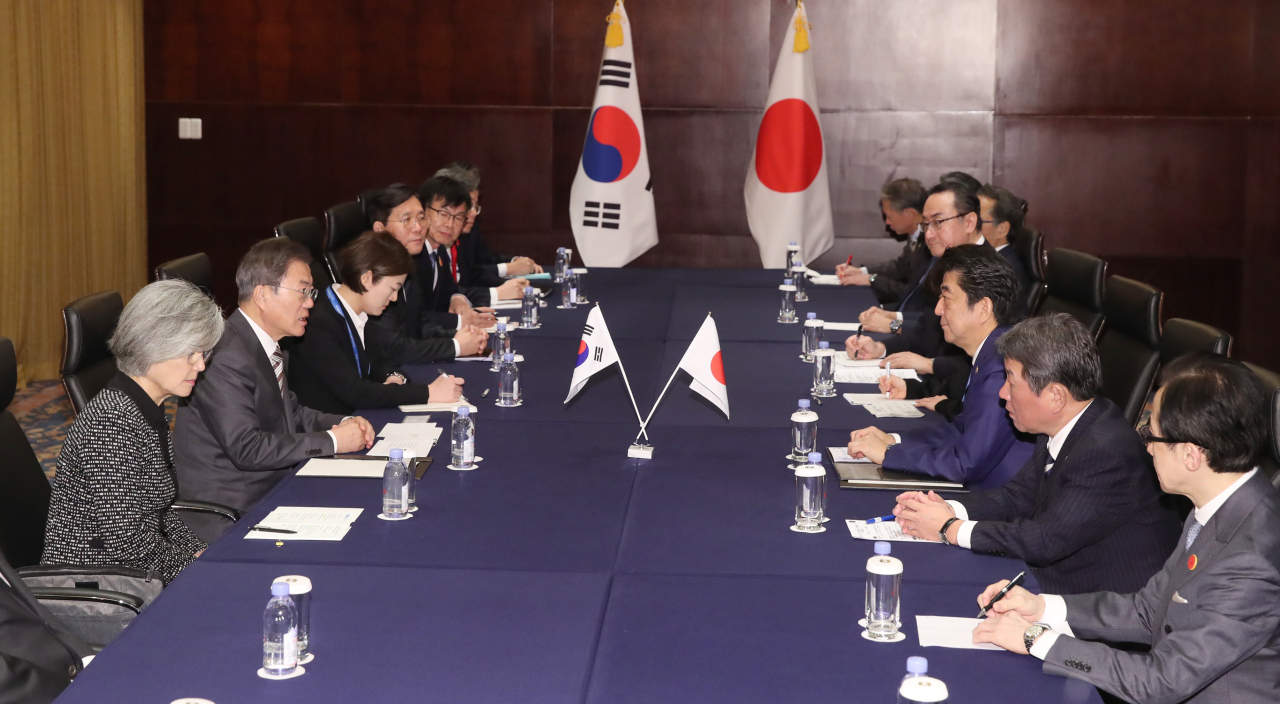South Korea and Japan have revived top-level dialogue, but it will take a while for the squabbling neighbors to make substantive progress toward resolving the core issues, experts said Wednesday.
South Korean President Moon Jae-in and Japanese Prime Minister Shinzo Abe held a summit, their first formal talks in 15 months, on the sidelines of the South Korea-China-Japan trilateral summit in the southwestern Chinese city of Chengdu.
 |
South Korean President Moon Jae-in speaks during the summit with Japanese Prime Minister Shinzo Abe at a hotel in Chengdu, China, on Tuesday. (Yonhap) |
No breakthroughs were made, but the two agreed to maintain dialogue to resolve key matters, including forced labor and trade issues.
Bilateral relations hit rock bottom after South Korean Supreme Court rulings, which found that Japanese firms must compensate South Korean victims of forced labor during Japan’s 1910-1945 occupation of the peninsula. In an apparent response, Japan removed South Korea from its export control whitelist in July, and it imposed tougher regulations on the export of key semiconductor-related materials to South Korea.
“To fully restore cooperative relations, it is necessary to consider the domestic politics of both sides as well as the regional security environment,” said Leif-Eric Easley, a professor at Ewha University. “The Moon-Abe summit can provide further momentum to trade security talks and the South Korean National Assembly’s draft legislation for compensating wartime labor survivors.
“The keys are to keep relations moving forward to avoid moving backwards, and to focus on doing it right rather than doing it fast,” he added.
Japanese media outlets also emphasized the resumption of dialogue, while acknowledging that the outstanding issues have to be addressed.
“The abnormal situation, where the two leaders weren’t able to communicate, was resolved for now,” said major Japanese media outlet the Yomiuri Shimbun. “But the differences in their positions over the issue stayed the same.”
“The occasion provided a chance for the two sides to listen to their position and explanation. Through this meeting, the two heads agreed that they need to resolve this issue through dialogue and that itself has a big significance,” said a Cheong Wa Dae official on condition of anonymity.
Following the summit, Abe called on South Korea to take responsibility for the forced labor issue and heal the bilateral relationship. The two leaders had allotted one-third of the 45-minute meeting to the forced labor issue.
“The promises between the countries need to be kept,” Abe told reporters regarding the forced labor issue. “Korea should make a step to restore the relationship between Japan and Korea to a healthy state.”
Japan maintains that the Supreme Court decisions violate international law and that all wartime issues between the two countries were settled through the 1965 treaty that normalized bilateral relations.
Meanwhile, President Moon urged Abe to drop all Tokyo’s recent export control measures and revert to the situation before July 1.
The two sides also discussed security concerns amid escalating threats from North Korea’s nuclear and missile program, and the North’s so-called “Christmas gift” to the United States. The two countries agreed on the importance of Korea-Japan and Korea-Japan-US cooperation.
Earlier in the day, Moon and Abe sat down with Chinese Premier Li Keqiang and agreed to work together to facilitate progress in US-North Korea dialogue and toward peace on the Korean Peninsula.
By Ahn Sung-mi (
sahn@heraldcorp.com)




![[Herald Interview] 'Trump will use tariffs as first line of defense for American manufacturing'](http://res.heraldm.com/phpwas/restmb_idxmake.php?idx=644&simg=/content/image/2024/11/26/20241126050017_0.jpg)

![[Health and care] Getting cancer young: Why cancer isn’t just an older person’s battle](http://res.heraldm.com/phpwas/restmb_idxmake.php?idx=644&simg=/content/image/2024/11/26/20241126050043_0.jpg)

